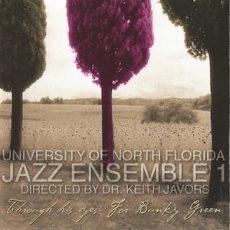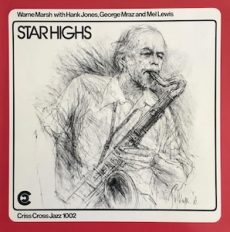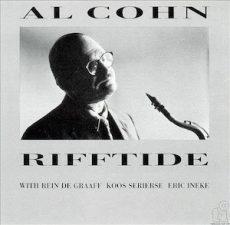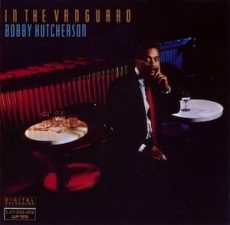
Daily Dose Of Jazz…
Tom McEvoy was born on February 13, 1981 into a non-musical family but discovered his passion for music by chance. Early in his life he was mesmerized by Beethoven’s Pathetique Sonata played in a Peanuts cartoon, and immediately went to his toy piano to try and figure it out. He had a similarly powerful reaction to a video of Louis Armstrong he saw a few years later. He had his first ensemble experience in kindergarten, when his teacher played the piano in class and led the students in song and knew he wanted to be a musician.
His formal training began with classical piano at six, adding the cello at age nine and gaining an appreciation for ensemble playing. His skill and musicality led to McEvoy receiving top marks in state piano judgings and invitations to play cello with the state honors youth orchestra. His life changed when he bought Ahmad Jamal’s Pershing: But Not For Me and Monk’s Straight, No Chaser. Immersing himself, he began to experiment with composition and improvisation. Joining his high school jazz band in his senior year, they went on to win awards for best band and best rhythm section at the tri-state competition at James Madison University that year.
Tom’s first college stop was at Virginia Tech majoring in engineering but he couldn’t leave the music and changed his major to jazz piano. He began playing professionally in the area, but left Tech with a scholarship to study at the University of North Florida with renowned pianist Kevin Bales. Distinguishing himself he represented the school in performances in Europe and North America.
While still a student, Tom established himself as a first-call pianist and performed extensively with some of the best musicians in the southeast, including Delbert Felix, Ben Tucker, Von Barlow, and Kebbi Williams. Moving to New York City in 2006, the following year at Juilliard he played a piano duo with Kenny Barron every week for two years. He studied and/or performed with Benny Golson, Mulgrew Miller, Christian McBride, Terence Blanchard, Gerald Wilson, Joe Wilder, Benny Green, Kenny Washington, and Steve Turre.
Presently pianist Tom McEvoy stays busy performing with his own groups, working as an in- demand sideman, and sharing his knowledge with the next generation.
More Posts: bandleader,history,instrumental,jazz,music,piano

Daily Dose Of Jazz…
Nicole Rampersaud was born on December 17, 1981 in Toronto,Canada. Studying trumpet through high school she then went to earn an undergraduate degree from the University of Toronto in Jazz Performance. From there a scholarship led her studies to the New England Conservatory, where she earned her Master’s Degree in Jazz Studies. While at the Conservatory, Nicole studied with Danilo Perez, John McNeil, Jerry Bergonzi, Joe Morris, Herb Pomeroy, Joe Maneri, and Bob Moses. She also studied composition with Michael Gandolfi and Ken Schaphorst.
Developing her singular voice that intersects with a broad range of musical practices and traditions, Nicole has become a sought-after collaborator with a host of artists. A few of his contemporary musicians are Anthony Braxton, Joe Morris, Ra-kalam Bob Moses, Sandro Perri, and many more.
Rampersaud’s primary groups include Brass Knuckle Sandwich with pianist Marilyn Lerner, a duo with guitarist Joel LeBlanc, and she is a founding member of the trio c_RL alongside Allison Cameron and Germaine Liu. She has performed with AIMToronto Orchestra, Eucalyptus, Michael Vlatkovich 5 Winds, and Montreal-Toronto Art Orchestra.
Since 2008, she has been building a catalogue of solo compositions that deconstruct the trumpet’s sonic possibilities and co-founded the improvisation-driven series, Understory. Trumpeter and composer Nicole Rampersaud continues to relentlessly seek out and create spaces to work with a diverse and expanding group of music-makers.
More Posts: bandleader,composeer,history,instrumental,jazz,music,trumpet

Requisites
Star Highs ~ Warne Marsh | By Eddie Carter
Warne Marsh enters the spotlight with Star Highs (Criss Cross Jazz 1002), an outstanding 1982 quartet album, his second release on the Dutch label. It was recorded two days after the tenor saxophonist’s performance at the NOS Jazz Festival in Amsterdam. Marsh, a talented musician who studied under pianist Lennie Tristano and later joined his group, is a notable figure in the Cool Jazz school. His collaborations with Lee Konitz and the jazz group Supersax have further solidified his reputation. He is accompanied here by the exceptional rhythm section of Hank Jones on piano, George Mraz on bass, and Mel Lewis on drums. My copy is the original Netherlands Stereo album.
The first side opens with Switchboard Joe, the first of four originals from the pen of Warne Marsh. The saxophonist guides George and Mel through a brief introduction to the quartet’s brisk theme. Marsh sets the tone with his opening statement, followed by a solo from Hank that answers him. Marsh then leads a brief conversation with George before the theme’s reprise. The ensemble then shifts to the title tune, Star Highs, starting with a relaxed groove for the melody. Marsh goes first with a beautifully constructed statement, followed by a concise comment from Jones leading to the closing chorus.
Hank Jones introduces his composition Hank’s Tune, a leisurely paced blues that gets into a happy mood from the quartet’s melody. Warne delivers the opening solo with a simplicity and melodic charm. Hank follows with a thoroughly delightful reading, and then George walks with a sense of fulfillment next. Warne gets the last word before the close. Charlie Parker’s Moose The Mooche gets underway with the quartet’s lively melody. Marsh takes off first with a robust opening statement, followed by Jones’s spirited solo. Mraz takes a short walk with authority. Lewis has the final say in a brief workout ahead of the climax.
Side Two opens to a brisk clip for the ensemble’s quick melody of Victory Ball by Lennie Tristano. Warne soars into the opening solo, with the rhythm section’s driving accompaniment. In the following interpretation, Hank is inspired to greater heights; then, Warne and Hank chase each other through the third reading. Lewis has a moment to shine before the theme returns. Marsh’s Sometimes starts with the trio’s tender introduction and a seductive lead solo by Jones. The saxophonist illustrates elegance and sensitivity in the second statement. Mraz rounds out the readings briefly, moving toward the gentle repeat of the theme.
One For The Band begins with a carefree theme. Warne takes the spotlight first, offering an endearing reading. Hank responds with a dreamy, satisfying statement before the quartet wraps things up. Gerry Teekens produced Star Highs, and Max Bolleman was the recording engineer. The album’s sound quality is superb, with a vibrant soundstage that emerges from your speakers as clearly as Waterford Crystal. Whether you’re a cool jazz fan or enjoy the tenor saxophone, Star Highs by Warne Marsh is a gem you should not miss on your next record-shopping trip. It’s a great introduction to a jazz giant that should appeal to any jazz lover and become a welcome addition to any library!
~ Moose The Mooche – Source: Wikipedia.org
© 2024 by Edward Thomas Carter
More Posts: choice,classic,collectible,collector,history,instrumental,jazz,music,saxophone

Requisites
Rifftide ~ Al Cohn | By Eddie Carter
Submitted for your approval this morning is an excellent album by Al Cohn. Rifftide (Timeless Records SJP 259) was recorded during the tenor saxophonist’s 1986 European tour. He’s joined on this date by three Danish musicians: Rein De Graaff on piano, Koos Serierse on bass, and Eric Ineke on drums. My copy is the 1987 Netherlands Stereo release. Side One opens with a popular song by Kurt Weill and Ogden Nash, Speak Low. The trio takes off with a lively introduction leading to the quartet’s theme. Al gets everybody in the mood with a spirited opening statement. Rein swings into action next with an energetic reading. Eric has a vigorous conversation with the saxophonist ahead of the theme’s restatement and fadeout.
Blue Monk by Thelonious Monk is a slow blues that was the pianist’s favorite and one of his most recorded songs, a testament to its enduring appeal. The foursome begins the melody gently, leading to Cohn’s gorgeous interpretation. De Graaff is equally graceful on the following solo, and then Serierse shows his tender side in a pretty presentation preceding the reprise and finale. The tempo for the quartet’s quick melody moves upward to begin the 1945 jazz standard, Hot House by Tadd Dameron. Al takes the lead and crafts an exciting solo. Rein meets the challenge with a fiery passion in the following interpretation. Al reappears for the closing chorus and leads the group to the finish line.
The Thing by Al Cooper starts the second side with the foursome’s medium melody. Cohn cruises comfortably into the opening interpretation. De Graaff follows with a silky smooth statement, and then Serierse provides the exclamation point until the closing chorus. We’ll Be Together Again by Carl T. Fischer, and Frankie Laine is a beautiful ballad from the forties, and the group begins with a gentle melody. The saxophonist opens his first of two solos with an intimate story. Rein caresses each note of the following solo with tranquil tenderness. Al returns for his second reading, complemented by the rhythm section’s hauntingly beautiful support before the song’s summation.
The album ends with the title tune Rifftide by Coleman Hawkins. It’s a pretty tune that the quartet opens at a slow tempo for the melody. Cohn’s opening solo is particularly stirring; De Graaff has the next spot and draws the listener into the second statement. Serierse has a short reflective moment closer, leading to the theme restatement and climax. Al’s career, which lasted nearly five decades, was marked by numerous achievements. He recorded thirty-five albums as a leader, including fourteen years co-leading a quintet with Zoot Sims. He was also a successful arranger for several big bands and worked on Broadway. Al Cohn passed away from liver cancer on February 15, 1988, at age sixty-two.
Wim Wigt produced Rifftide, and Max Bollerman, who owns and still operates Studio 44, was the man behind the dials of the recording. The album’s sound quality is stunning, with a stellar soundstage transporting the quartet to your listening room with crystal-clear fidelity. If you’re a fan of cool jazz and post-bop, I invite you to check out Rifftide by Al Cohn the next time you’re on a record-shopping trip. It’s a terrific album that’s sure to please even the most discriminating jazz fan, and I highly recommend it for a spot in your library!
~ Blue Monk, Speak Low, We’ll Be Together Again – Source: JazzStandards.com
~ Al Cohn – Source: Wikipedia.org
~ © 2024 by Edward Thomas Carter
More Posts: choice,classic,collectible,collector,history,instrumental,jazz,music,saxophone

Requisites
In The Vanguard ~ Bobby Hutcherson | By Eddie Carter
This morning’s discussion arose because I’ve been listening intensely to several great vibraphonists in my library recently, leading me to an underrated live album by Bobby Hutcherson. In The Vanguard (Landmark Records LLP-1513) hit the stores in 1987 and documents excerpts of his performance over two December nights the year before at the Village Vanguard. Bobby was the first artist Orrin Keepnews signed for his new record label; this was his third release. The quartet consists of Bobby Hutcherson on the vibraphone and marimba, Kenny Barron on piano, Buster Williams on bass, and Al Foster on drums. My copy is the original U.S. Stereo album.
The opener, Little Niles by Randy Weston, is a jazz waltz. The quartet gets things off to a spirited start with their melody. Bobby opens the soloing with an infectiously swinging groove. Kenny keeps the lyricism intact with a compelling case ahead of the theme’s restatement and close. Estaté by Bruno Martino and Bruno Brighetti is up next. Williams and Hutcherson set the song in motion with a pretty introduction. Barron and Foster enter next to add sensitive warmth to the gorgeous melody. Bobby’s opening solo is beautiful; then Kenny articulates his ideas tenderly while Buster and Al hold everything together into the quartet’s graceful climax.
Well, You Needn’t by Thelonious Monk and Mike Ferro opens with Bobby’s introduction before the ensemble’s theme takes off quickly. Bobby is out of the gate first with an exhilarating reading. Kenny steps up next to play with exciting urgency. Buster and Al share a moment in the closer, preceding the foursome’s return with a quick resolution. Side Two starts with Some Day My Prince Will Come by Frank Churchill and Larry Morey. The ensemble establishes the song with a quaint melody that moves upward for Hutcherson’s opening solo. Barron turns in an exquisite performance next, and Williams provides a superbly conceived finale, one of the album’s highlights before the reprise and ending.
Witchcraft by Cy Coleman and Carolyn Leigh begins with a two-instrument dialogue between Bobby and Buster, segueing into the quartet’s lovely melody. Bobby kicks off the solos with a stream of imaginative ideas. Kenny takes the reins, gliding to the rhythm section’s buoyant beat ahead of the song’s conclusion. I Wanna Stand Over There by Bobby Hutcherson is off to the races during the quartet’s upbeat theme. Barron comes right out of the gate, bristling with energy. Hutcherson follows with a hard-driving interpretation; then Foster provides the album’s final fireworks in a short solo ahead of the theme’s restatement and climax.
In The Vanguard is a digital recording produced by Orrin Keepnews and Tom Mark, the recording engineer. George Horn mastered the album, and Danny Kopelson provided the digital transfer, editing and sequencing at Fantasy Studios. The album’s sound quality is exceptional, capturing the live energy and ambiance of the Village Vanguard. The listener becomes a part of the audience as the musicians perform with crystal-clear fidelity. Despite its high-quality performance and recording, this album is often overlooked in Bobby Hutcherson’s discography. But please don’t let that discourage you from checking out In The Vanguard by Bobby Hutcherson the next time you’re out record shopping. It’s a jazzy treat for your ears and an absolute pleasure to listen to, especially if you enjoy live jazz albums!
Postscript: Estaté is listed on the Side One label and back album cover with two composers, Bruno Martino, and Bruno Brighetti. I have no idea why this happened, but they are the same man, Bruno Martini. He was an Italian composer, pianist, singer, and songwriter. Estaté was his best-known composition; many jazz musicians and vocalists have recorded it since its first appearance in 1960. Martino’s career lasted fifty-five years; he died on June 12, 2000, at age seventy-four.
~ Bruno Brighetti, Bruno Martino – Source: Discogs.com
~ Some Day My Prince Will Come – Source: JazzStandards.com
~ Little Niles, Witchcraft – Source: Wikipedia.org
© 2024 by Edward Thomas Carter
More Posts: choice,classic,collectible,collector,history,instrumental,jazz,music,vibraphone




